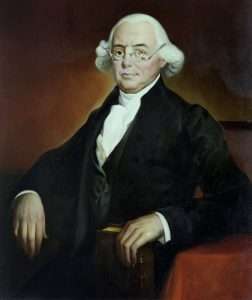The Volokh Conspiracy
Mostly law professors | Sometimes contrarian | Often libertarian | Always independent
Today in Supreme Court History: October 28, 1787
10/28/1787: James Wilson gives speech to the Pennsylvania ratification convention, arguing that there was no need for a Bill of Rights.

Editor's Note: We invite comments and request that they be civil and on-topic. We do not moderate or assume any responsibility for comments, which are owned by the readers who post them. Comments do not represent the views of Reason.com or Reason Foundation. We reserve the right to delete any comment for any reason at any time. Comments may only be edited within 5 minutes of posting. Report abuses.
Please to post comments


Jackson v. Allen, 132 U.S. 27 (decided October 28, 1889): case should not have been removed because diversity of citizenship not clearly established; vacating judgment after trial and remanding to Circuit Court with directions to remand to state court (interestingly the Court notes that citizenship at the time of removal was relevant, as well as at the time of commencement; I thought only the latter was looked to) (I know from experience that federal judges will insist on tracking down every silent partner of every party before ruling on diversity)
Bartone v. United States, 375 U.S. 52 (decided October 28, 1963): a federal court can’t extend a sentence for violation of parole without the parolee being present (see Fed. R. Crim. Pro. 43)
Fuller v. Alaska, 393 U.S. 80 (decided October 28, 1968): here the Court holds that a recently announced exclusionary rule (as to evidence from illegal wiretaps) is to be applied only prospectively
This is an interesting counterfactual: How would the history of the US have developed without the first ten amendments? Logically there would have been more laws like the Alien and Sedition Acts that violate civil liberties, but I should think there would also have been more primacy of the political branches and less willingness to tolerate politicians who violate civil liberties.
During the Convention Roger Sherman opposed the idea of a Bill of Rights because he thought it would be too restrictive. “The state constitutions are not repealed by this federal Constitution, and being in force are sufficient.” Hence the catch-all “savings clauses”, the Ninth and Tenth Amendments. Perhaps the Bill of Rights was only added to defang the opposition during the ratification debates and they did not expect it would have much practical effect.
When we see how broadly the general welfare clause (and one or two others) have been interpreted even with a BoR, it is as well we have one.
Why not look to other countries (UK, France...) that don't have a BoR for an example?
Not only does Britain have a Bill of Rights, some of the US BoR was inspired by it.
An unwritten BoR like the British constitution?
https://en.wikipedia.org/wiki/Bill_of_Rights_1689
It of course will also inspire the Fundamental Declaration of the Martian colonies in forty years or so.
Thanks.
Obviously our country would have turned out worse in terms of an ideal and more in the framework of past historical governments. But, no one can know for certain as the experiment can not be repeated. However, and because we have gotten here, today, 2023, in this position of great concern to the proposition of what constitutes the purpose of the many petty world states with their words put down to control their populations while ours here highlights the age old struggle between the People and "their" federal government.
Our 50 little entities do provide a bullwork against the behemoth which desires to control all, for the lack of proper control still remains the oldest of concerns. Words by themselves lack force. People give them life and force only when exercised. And, who is fit to exercise them in regards to their proper understanding ?
I think the fears of Wilson, Iredell, Hamilton and others that a Bill of Rights would lull people to sleep and make them unserious about protecting rights themselves were inaccurate as long as courts kept a distance, but became accurate as courts proclaimed the constitution to be theirs, beginning in the late 19th c.
We gradually stopped caring after that, because "the courts will figure it out"
No. The first time the Court did that was in Dred Scott v. Sandford (1857), when it held that the provision of the Missouri Compromise of 1820 that prohibited slavery in the Louisiana Territory north of the 36'30'' parallel was a deprivation of the property of slaveholders without due process of law in violation of the Fifth Amendment.
Looking at Table of Laws Held Unconstitutional in Whole or in Part by the Supreme Court searching for Amendment and sorting by date, the earliest case is listed as 1855 but appears to be from 1885 (so there may be other errors regarding earlier cases); the second case in that ordering is Dred Scott v Sandford (which invoked the Fifth Amendment among other constitutional provisions, according to that table) and the next is from 1867.
So the answer appears to be no, with respect to the Supreme Court. But that may also reflect that the effect of the Bill of Rights in early years was more political than judicial; Wikipedia notes in Alien and Sedition Acts that the Democratic Republicans denounced them as violations of the First Amendment, and repealed most when they took power "in part because of backlash to the Alien and Sedition Acts".